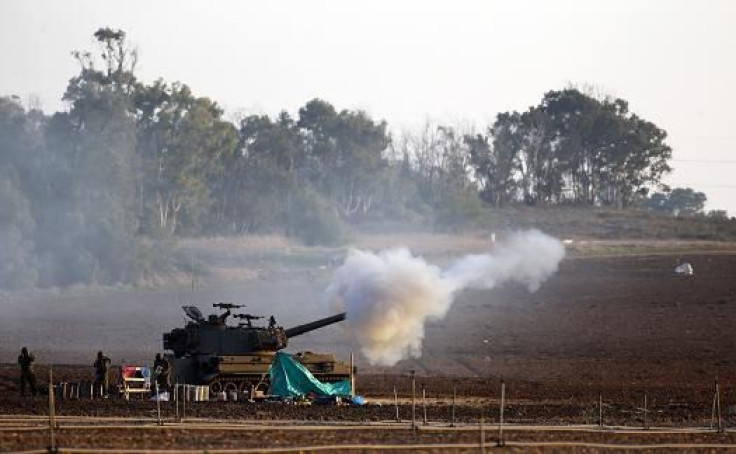Israel Mulls Cease-Fire, But Some Say It Won't Be Enough

As rockets rain down in Gaza and Israel, it becomes abundantly clear that there is no easy way out for either side. Hamas is the democratically elected government of Gaza, despite its official terrorist designation by the U.S., the EU, and other nations. And Israel, however brutal its tactics may look to much of the world, has absorbed some 12,000 of Hamas' rockets over the past 12 years, the IDF says.
Gilad Sharon, son of former Israeli Prime Minister Ariel Sharon, penned an op-ed in the Jerusalem Post on Monday in which he claimed that Operation Pillar of Defense, as Israel calls the current offensive, was now at a stalemate, and this time, Hamas was not going to curl into a ball and start begging for a cease-fire as in years past.
"This must not be allowed to end as did Operation Cast Lead," Sharon wrote of the 2008-09 campaign that began under similar circumstances and ended with a largely disregarded cease-fire and consistent "showers" of rockets still launched over Israel's southern border. "You have to know how to finish -- and finish decisively."
A "finish" in Sharon's mind does not end well for Palestinian civilians, whom he warns must "live with the consequences" of electing Hamas to lead them. "There should be no electricity in Gaza, no gasoline or moving vehicles, nothing. Then they'd really call for a cease-fire." Either this, he says, or reoccupy the strip as it did in the years leading up to 2005.
Sharon's stance represents one end of the spectrum of beliefs about how best to end this conflict. The Daily Star in Lebanon, the Middle East's largest English-language daily newspaper, represents the other end of that spectrum. The Daily Star's editors call Israel's response to Hamas's rockets "gratuitously disproportionate" and say the only solution to the problem is to address the underlying question of "the right to Palestinian statehood … and the Jerusalem question."
The Daily Star also added its voice to the growing chorus -- a chorus that includes Turkish Prime Minister Recep Tayyip Erdogan -- of voices who say much of the latest escalation in the conflict is a bid by Israeli Prime Minister Benjamin Netanyahu to help him win re-election in January. "Netanyahu has certainly picked his timing well for this latest Gaza offensive," the Star wrote, pointing out the weakened political state of many of Israel's neighbors, and adding, "ahead of an election, he was more than likely to win anyway, Netanyahu is effectively neutralizing the opposition … by stressing, without a hint of irony, the notion that Israel is a country under attack."
Nathan Brown, a senior associate in the Carnegie Endowment for Peace's Middle East Program, stands in the middle. Brown points out in a CNN column that most experts are predicting the situation will be "unchanged" once the rockets stop falling, and the political damage on both sides will be severe. And waiting for Hamas to simply "go away," he said, will not work. The Obama administration needs to "deal with the Israeli-Palestinian conflict that really exists, rather than to pretend there is still a 'peace process.'"
Peace talks on the big issues do appear to be dead in the water. Neither side, Brown pointed out in The New Republic, has a method for effectively dealing with the other. "Any hopes since then that Hamas would moderate have been squandered," he wrote. "Israeli leaders offers only glum, limited, and even cynical cooperation." The current problem, he wrote, "is beckoning for a new approach." A simple cease-fire will not be enough.
There's a third player in all this: Egypt and the Muslim Brotherhood. Despite its close ties to Hamas and an electorate eager for the government to break from former President Hosni Mubarak's Israel-tolerant policies, Egypt is nearly bankrupt and desperate for American economic help. The fear of alienating America necessitates working with Israel to ensure any cease-fires actually stick, Ehud Yaari writes in Foreign Affairs. In order to ensure any kind of lasting solution, Yaari said, the U.S. needs to make sure weapons and rockets don't continue to magically make their way through Egypt and end up in Hamas's hands. Either way it ends, Brown wrote on CNN, Egypt is likely to emerge looking embarrassed and powerless.
And where is the U.S.? On Israel's side, certainly, as Elliot Abrams of the Council on Foreign Relations wrote in The Weekly Standard, but "the coming year will be much tougher," and we will quickly see "whether there is a U.S. policy on Israeli-Palestinian issues beyond stopping the current violence."
Meanwhile, on the ground, 57 percent of Americans support the Israeli side of the current conflict, a CNN poll found, but with key demographic differences, CNN polling director Keating Holland pointed out.
"Only four in ten Democrats think the Israeli actions in Gaza are justified, compared to 74 percent of Republicans and 59 percent of independents," Holland said. "Support for Israel's military action is 13 points higher among men than among women, and 15 points higher among older Americans than among younger Americans."
Some Israelis themselves are protesting the airstrikes, and they oppose a threatened ground invasion. On Sunday in Tel Aviv, demonstrators called on people to "refuse the election war" and "refuse to die or kill in the name of political spin," Global Voices reported.
© Copyright IBTimes 2024. All rights reserved.












